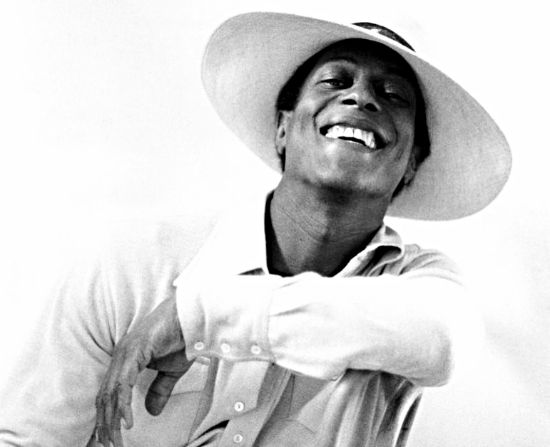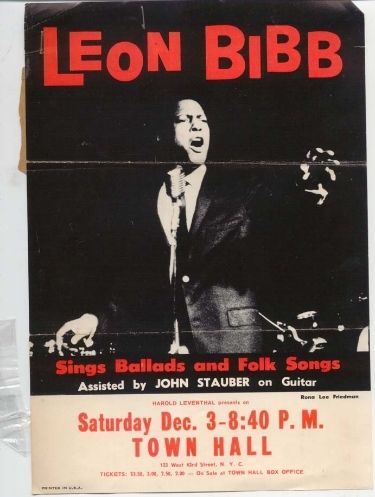Leon Bibb. Born February 7, 1922 Died October 23, 2015
Some of you are too young to have lived through parts of the civil rights movement that included singers and musicians who used their voices and instruments to advance the struggle for racial justice. They are often referred to as “folk singers.” Some of those names, like Pete Seeger’s may be familiar to you, and others not.
I was blessed to grow up with parents who surrounded me with political activists. Among those activists were actors and musicians. When we moved to Hollis, Queens NYC when I was going into the 5th grade, a few blocks away from us was the home of friends of my parents—Leon Bibb, his wife and children. I got to spend a lot of time in and out of that home—the Bibbs had twins, Eric and Dorie, four years younger than I was and a younger daughter Amy. Through their doors would came Paul Robeson (Eric’s godfather), Theodore Bikel, Peter, Paul and Mary, and numerous other performing artists, including Leon’s brother-in-law pianist and jazz composer John Lewis.
I have to thank Leon’s influence for exposing me to folk music, black folks songs, as well as to white leftist singers whose music helped shape my world.
Though he has been gone from this country since 1969 when he left the U.S. for Canada, his music and the memories of my young adulthood are with me still. I only got to see him once during the intervening years. He is gone, but his music lives on.
The New York Times just posted a lengthy obituary.
Leon Bibb, Actor, Folk Singer and Civil Rights Activist, Dies at 93
Leon Bibb, an actor turned folk singer whose powerful, elegant baritone voice made him a prominent figure in the folk-music revival and a stirring performer at the landmark civil rights demonstrations of the 1960s, including the third march from Selma to Montgomery, Ala., in 1965, died on Friday in Vancouver, British Columbia. He was 93.
…
It was the dearth of parts for black actors that motivated Mr. Bibb to remold himself as a folk singer in the mid-1950s, drawing on the spirituals that one of his aunts had sung to him as a child in Louisville, Ky. Albums like “Leon Bibb Sings Folk Songs,” released by the Vanguard label in 1959, and frequent performances on the television show “Hootenanny” made him one of the more prominent folk singers of the era. A regular at clubs like the Bitter End and the Village Gate in New York and the hungry i in San Francisco, he sang at the first Newport Folk Festival in 1959 and reached a broad television audience that same year when he sang “Sinner Man,” one of his signature songs, on “The Ed Sullivan Show.”Mr. Bibb became involved in the civil rights movement early on, taking part in voter-registration drives in the South and performing at the 1963 March on Washington. In 1965 he performed in front of the statehouse in Montgomery with Joan Baez, Oscar Brand and Harry Belafonte, whom he had known since their acting days at the American Negro Theater in Harlem. “He was really committed to the cause of civil rights, and he was hugely inspiring,” Mr. Belafonte said in a telephone interview. “Between him and Mahalia Jackson, we had all the music we needed for the movement.”
Leon Bibb – Rocks & Gravel 1963 from HOOTENANNY
Bibb was born in Louisville, Kentucky and was one of the performers at the first Newport Folk Festival in 1959. He also had his own NBC television talk show. During the late-1950s and early-1960s, Bibb was one of a number of American entertainers, such as his good friend Paul Robeson, who were blacklisted for alleged ties to left-wing groups and causes.
…
He is the father of the Helsinki, Finland based acoustic blues singer/songwriter Eric Bibb.
In 2009, he was made a Member of the Order of British Columbia. At the time of receiving this honor, Bibb was still an active performer. Leon Bibb made an impressive debut on Columbia Records in 1962 with the album “Leon Bibb Sings”. This song “Dance Boatman” is taken from that album.
Leon Bibb receiving an Honorary Degree at UBC Vancouver 2011. He sings “Motherless Child,” and talks about growing up in racist, segregated Louisville Kentucky.
“Look Over Yonder” Recorded live at St. Andrew’s Wesley Church on Feb. 1, 2013 in HD (1080p on XA10).
This is a very special (impromptu) moment during an amazing concert where 90yr old Leon Bibb is moved by the moment to go off program and offer a song directly from his heart!
In my album of memorabilia, I still have the poster from Leon’s Town Hall Concert
Leon was part of the “Isn’t This a Time! A Tribute Concert for Harold Leventhal“, which included Theodore Bikel, Erik Darling, Ronnie Gilbert, Arlo Guthrie, Fred Hellerman, Peter Paul & Mary and Pete Seeger. Harold Leventhal” was the noted leftist folk music promoter, known as “The Fifth Weaver”.
Last year, Leon was working with composer Bill Sample on “Like a River – Leon Bibb Songbook and Recording Project”
Leon’s son Eric Bibb has carried on the music tradition. They did a wonderful album together “A Family Affair.”
The chariot has carried Leon home…and the music continues.



What I think is amazing is the Eric is now performing with his daughter Yana.
The music tradition is truly a family affair.
Thanks, Dee, for sharing the life and music of Leon Bibb with us.
Thanks for listening Jan.
So few folks today know who he was.
Denise, I am now one of the few, thanks to you. What a wonderful singer he must have been! I liked that folk music era,although I never got any further into it than Peter, Paul, and Mary and the Kingston Trio. Then the Beatles happened.
Thanks again for educating us. I love reading about the black history and culture I never knew about. It’s awful that people like Bibb and Josephine Baker had to leave the country in order to exercise their talent. At least, nowadays African-American talent can flower into being in this country.
Thanks Diana. There were also writers who left – like Richard Wright and James Baldwin.
Political activists left as well, many settling in Ghana and Tanzania – W.E.B. Du Bois was one of them.